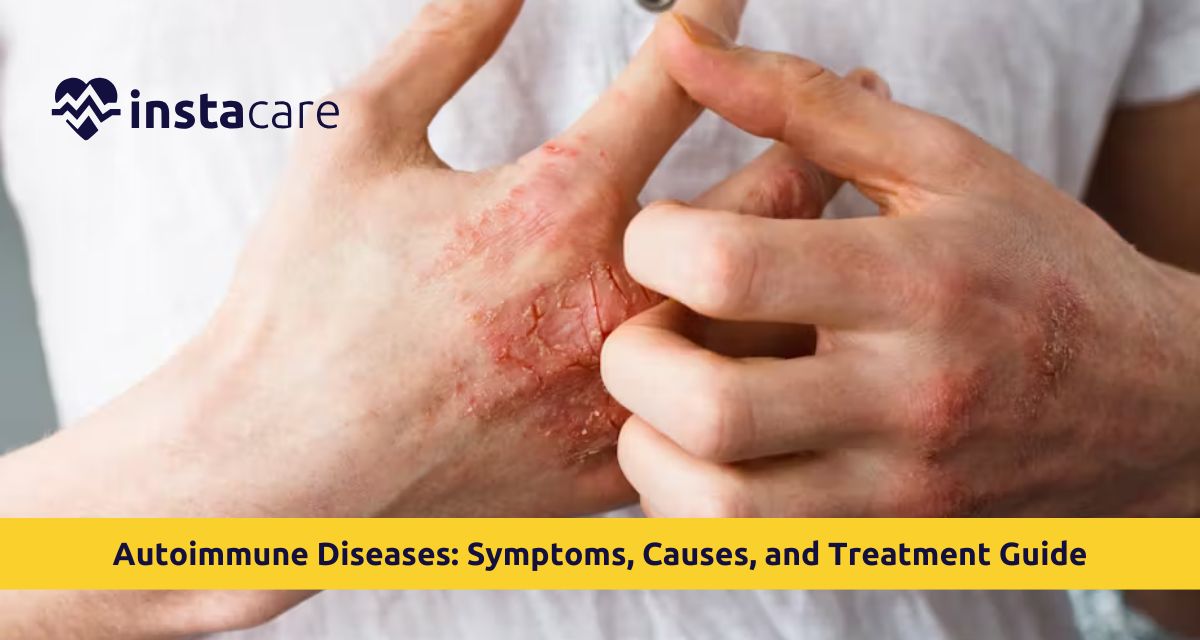Viruses, bacteria and harmful toxins are prevented from infecting the body by the immune system. Instead of shielding the body, in autoimmune disease it attacks the body’s own tissues. Differs from a regular disease where the body tries to control the reason for the illness, in autoimmune diseases the immune system attacks healthy cells, causing inflammation and harm to the tissues.
Different kinds of diseases on the skin, in joints, organs or body systems can cause the immune system to attack them. People need to learn about auto-immune illnesses because there are more than 80 different kinds and knowing how they function is important.
What Are Autoimmune Diseases?
With this condition, the immune system of the body does not recognize its own body cells and attacks them as if they were foreign. Because of the immune system’s erratic response, chronic inflammation can take place and organs or tissues may get damaged as a result.
These common autoimmune diseases are divided into systemic, affecting the entire body and organ-specific, affecting specific organs (e.g.,
rheumatoid arthritis, lupus, type 1 diabetes or Hashimoto's thyroiditis).Some of the most common autoimmune disorders list are:
- Rheumatoid arthritis (RA) – affects joints.
- Lupus (SLE) – affects skin, joints, kidneys, etc.
- Multiple sclerosis (MS) – affects central nervous system.
- Psoriasis – leads to thickened skin cells.
- Celiac disease – affects small intestine due to gluten intolerance.
- Hashimoto's thyroiditis – entails destruction of thyroid tissue.
- Type 1 diabetes – entails destruction of insulin-secreting cells of the pancreas.
There also are a number of rare autoimmune diseases such as scleroderma and Behçet's disease which are more difficult to diagnose and treat.
Some Causes of Autoimmune Diseases
Although the causes of autoimmune diseases cannot be explained, researchers explain the etiology of causation as an interaction among environment, genes, and lifestyle. The largest etiology in layman's language is as below:
Genetics
Genetic susceptibility is the underlying cause. If there are autoimmune diseases in your family, then you will get one. There are genes that predispose you to getting a particular disease, e.g., HLA genes in lupus or type 1 diabetes.
Environmental Trigger
Chemical, viral, or bacterial infection is the etiology to destabilize the immune system. These chemicals can make a susceptible individual to autoimmune disease develop an illness.
Hormonal Factors
Autoimmune disease occurs much more frequently in females than in males. Hormonal fluctuation, i.e., of estrogen, may perhaps be the cause. Autoimmune disease in females predominately occurs or has expressions or presents exacerbating expressions with or after pregnancy.
Diet and Gut Health
There is increasingly strong evidence to propose that autoimmune disease and gut dysfunction correlate. Derangement of gut microbiome leads to high gut permeability ("leaky gut") because toxins and unabsorbed food get fermented and provoke an immune response. autoimmune disease and diet are thus interrelated.
Stress
Chronic physical and emotional stress may be a potential inducer or precipitant of autoimmune disease. Stress interferes with immune regulation, and exacerbations of autoimmune disease occur during periods of intense emotional or mental stress.
Infections
Certain infections caused by bacteria or viruses imitate body tissues, and hence there is an immunity that can never be disturbed. The effect has been termed molecular mimicry and has been said to be responsible for causing rheumatic fever and Guillain-Barré syndrome.
Symptoms of Autoimmune Disease
Autoimmune disease symptoms overlap with each other, and the symptoms are not easy to diagnose. Some of the autoimmune disease manifestations are:
- Chronic fatigue
- Joints get painful and inflamed
- Muscle weakness or aching muscles
- Fever or low-grade fever
- Change in color of skin or rashes
- Gastrointestinal upset as diarrhea, bloating, or cramps
- Brittleness of hair or loss of hair
- Forgetfulness, fuzzy head, or unable to concentrate
- Fingers and toes, numbing or tingling
These symptoms characteristically flare and remit and flare and remit in flares for so long and then again recur. Autoimmune disease and fatigue are also concurrent and most patients have awful fatigue after rest.
What Is Autoimmune Disease Diagnosis Process?
Autoimmune disease diagnosis is sometimes difficult. Due to the fact that all autoimmune disorders share overlapping symptomatology, too, physicians have to make proper diagnosis by clinical examination and laboratory tests.
Medical History
Your family history, symptoms, and genetic makeup along with the environmental or lifestyle factor involved will be asked for first by the doctor.
Physical Examination
Swelling of the joints, rash, or neurological changes can be the presenting initial feature of an autoimmune disease.
Blood Tests
Some blood tests detect autoimmune activity:
- ANA (Antinuclear Antibody): Positive result shows presence of autoimmune activity.
- CRP and ESR: Indirect markers of the inflammatory process of the disease in the body.
- Autoantibody tests: Disease screening, for instance, anti-dsDNA in lupus or anti-CCP in RA.
- Thyroid function tests: Similarly useful in autoimmune thyroid disease such as Hashimoto's or Graves' disease.
Imaging
X-rays, MRI, or ultrasound can detect joint damage, organ enlargement, or nervous system change.
Biopsies
Skin, kidney, or intestinal tissue samples are excised to provide a definitive diagnosis in complex cases.
Some Treatment Modalities of Autoimmune Disease
Most autoimmune diseases cannot be cured, but some drugs can reduce symptoms, suppress inflammation, and block damage.
Medicines
- Anti-inflammatory medicines: Anti-inflammatory drugs (NSAIDs) such as alibuprofen suppress inflammation and pain.
- Corticosteroids: Corticosteroids suppress flares by suppressing the immune activity instantly.
- Immunosuppressants: Medications like methotrexate and azathioprine suppress the immune system to avoid attacking normal tissues.
- Biologics: Targeted therapy suppresses certain of the immune reactions. They have been employed in the management of conditions such as rheumatoid arthritis, psoriasis, and inflammatory bowel disease.
Lifestyle Changes
Lifestyle modification is a powerful tool in the management of chronic autoimmune diseases.
- Diet: Anti-inflammatory diet and the use of vegetables, fruits, lean protein, and healthy fats are miracles of symptom relief. Gluten-free, dairy-free, or low-FODMAP diet will be suitable for some patients based on the disease.
- Exercise: Gradually exercising daily, like yoga or swimming, relaxes joints and tension.
- Rest: Rest provides time for healing and restoration of the autoimmune disease and immune system.
Stress Management
Long-term stress will trigger or exacerbate autoimmune flares. Autoimmune disease treatment in the shape of meditation, mindfulness, therapy, or even taking leave can ensure overall wellness.
Supplements and Natural Therapies
Some people find solace in the intake of
omega-3 fatty acids, vitamin D, probiotics, and turmeric but always have to be reasoned out with a medical practitioner before use.
Supportive Therapies
Physical therapy, occupational therapy, or counselling can make an individual productive every day and free the mind. In working with autoimmune diseases, eventually it is just a trade-off of medical treatments and proper care of oneself in listening to the body about what it enjoys most and adapting accordingly.
Conclusion
Autoimmune illnesses are multifarious and complicated conditions needing a well-educated, balanced approach. With disabling to pervasive presentation, premature recognition and frequent follow-up are the best method of quality of life maintenance.
Though a genetic and environmental cause is the culprit for such diseases, changes in lifestyle, most importantly, diet and stress management can be a grand success. Whether you or your family member happens to be a victim of auto-immune diseases or not, you being aware of symptoms, aetiology, and management places you in the driving seat of your own fate.
Please book an appointment with the
best Rheumatologist in Lahore, Karachi, Islamabad, and all major cities of Pakistan through
InstaCare, or call our helpline at 03171777509 to find a verified doctor for your disease.





